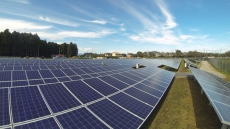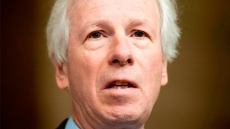VANCOUVER — A new study says Canada would get a big economic boost from a liquefied natural gas industry, especially British Columbia, including tens of thousands of jobs and billions of dollars in economic activity.
The Conference Board of Canada's report was issued Monday as the future of Canada's LNG industry is complicated by low global energy prices that have delayed at least two B.C. projects.
The board found that if the industry produces 30 million tonnes per year of LNG, Canada's economy would grow by $7.4 billion a year over 30 years.
The report, titled "A Changing Tide," says the main beneficiary would be British Columbia, which would see 46,800 jobs created and $5.3 billion a year of economic growth over that 30-year period.
Premier Christy Clark has long been a proponent of LNG, saying the industry would bring 100,000 new jobs and more than $100 billion in revenue over 30 years.
The picture painted by the Conference Board of Canada is not quite as rosy, but still projects that LNG would add $3 billion and $3.2 billion in revenues to the provincial and federal coffers respectively between 2016 and 2045.

The study, which received funding from Progress Energy Canada Ltd., predicts the industry would be a big employer, too, providing 65,000 ongoing jobs in several sectors, including the trades, business and finance.
But the report also warns that investment is needed in education and training. It says the industry and government need to connect aboriginal people with job opportunities.
The study, which is based on a model of three hypothetical projects, comes out days after the AltaGas-led group behind the Douglas Channel LNG project stopped development, citing low prices and an oversupplied market.
The Douglas Channel project, with a proposed capacity of 550,000 tonnes of LNG per year, is the smallest of the 21 proposed LNG projects in B.C.
But it's not the only LNG development to have been sidelined.
Earlier this month, Royal Dutch Shell delayed its final investment decision on a proposed multibillion-dollar export terminal near Kitimat until the end of this year.
Both projects have been pushed back as the global LNG industry is reeling from a plunge in prices brought on by oversupply of both oil and natural gas.

A proposed $36 billion LNG facility near Prince Rupert, backed by Malaysian state-owned energy giant Petronas, is awaiting federal approvals before the final green light decision is made. Petronas is the principal owner of Progress Energy.
The supply issue isn't going away soon, with a number of major LNG projects just starting to ship, including one in the U.S. that made its first shipment of LNG last week.
The conference board says it scaled back its study to a more conservative 30 million tonnes a year of development, compared with the 80 million to 120 million tonnes per year that the B.C. government based its initial impact studies on.
It also notes its findings are subject to a "great degree of uncertainty" because no projects are yet under construction.
The study said the vast majority of the jobs and spending would come from the upstream production side of the industry, with the opening of export markets leading to around a doubling of natural gas production in B.C.

The board's report acknowledges that current global crude prices have "cast a shadow over LNG markets," but says the future of the industry is still positive because of the continued growth of energy demand in Asia.
"While the final level of investment, capacity, and timing of projects is uncertain, what is certain is that the development of an LNG industry in B.C. would result in significant benefits for Canadians and their governments," the report says.





